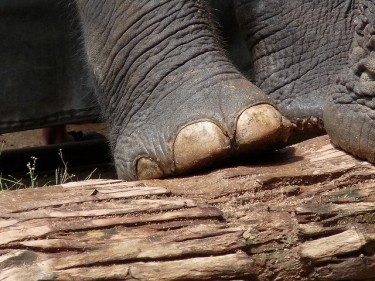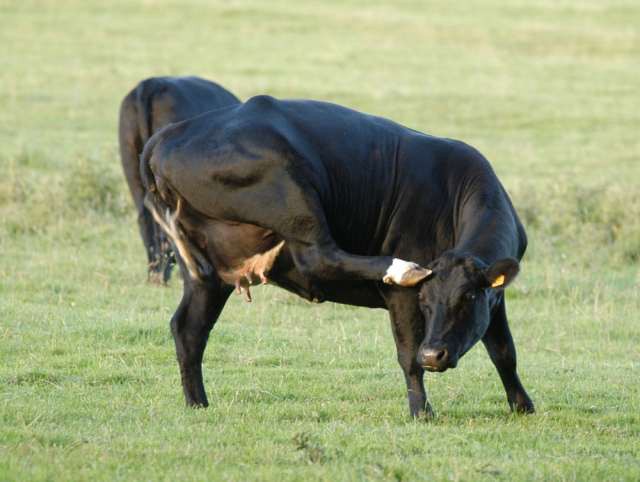Pete Fornatale, 1945-2012

“He did one of the first American interviews with Elton John, and got a rousing ovation when he brought a rented surfboard to Carnegie Hall for a Beach Boys show. He introduced Curtis Mayfield to Bob Dylan at a Muhammad Ali fight. In 1982 he started ‘Mixed Bag,’ a program that emphasized singer-songwriters, on Sunday mornings. His regular guests included Suzanne Vega, who introduced herself to him by sending a fan letter.”
— If you grew up in this area and listened to rock radio, Pete Fornatale’s voice was one of the voices of your childhood. Fornatale died yesterday at the age of 66.
What Does Elephant Taste Like?
What Does Elephant Taste Like?
by Raynor Ganan

As anyone educated by “The Flintstones” knows, one of prehistoric man’s favorite meals was barbecued mastodon ribs. Paleolithic cave paintings seem to support the claim (though whether the ribs were prepared with a dry rub or marinade is still a hot topic in archaeological journals). In fact, evidence suggests that early hunters found their way to the new world in the first place by chasing mammoth herds as they fanned across continents. So how did the cow, an ugly-looking milk monster from Vermont, become the utilitarian protein of the masses while the elephant, the mammoth’s lumbering grand-nephew, is only ever eaten in animal cracker form? The long answer involves section headings like animal lifespan, infrastructure, social taboos, endangered species lists and insurmountable husbandry challenges.
The short answer, however, is simple: the elephant has the strength of a hundred Danny Trejos. Add in its trunk and a set of thrashing tusks, and it’s best not to mess with one. But back in the day, certain adventurous individuals did eat elephant flesh and live to tell the tale for our vicarious benefit. Here are their wild accounts.
One of the earliest written accounts comes from 1456 when the Venetian explorer Alvise Cadamosto sailed up the Gambia River and was served a dish of pachyderm two ways. “I had some both roasted and boiled,” he wrote, “but I found it hard and of an unpleasant relish.” Despite his lukewarm reaction, Cadamosto returned to Portugal with a souvenir of a salted elephant ear for his patron, Prince Henry the Navigator.
In 1790, François Le Vaillant was given an elephant’s foot for breakfast while visiting a tribe in the African interior. Ever the French gourmand, he wrote in his journal:
…it exhaled such a savory odour, that I soon tasted and found it to be delicious. I … could not conceive that so gross and heavy an animal as the Elephant, would afford such delicate food. “Never,” said I, “can our modern epicures have such a dainty at their tables; let forced fruits and the contributions of various countries contribute to their luxury, yet cannot they procure so excellent a dish as I have now before me.”
In 1859, Paul du Chaillu, the “discoverer” of gorillas, enjoyed a grand feast in equatorial Africa. He later boasted that the feast included all manner of jungle fauna including crocodiles (with lemon and cayenne pepper), a “charming monkey1,” wild buffalo tongue, otter, antelope, gazelle, manatee, water turtles, a boiled gorilla, and plantains (for good measure). Here, he describes the elephant plate in his 1869 travelogue:
The drums are beating furiously again and again. Twenty of the King’s wives have come out, each bringing a dish with her, which they deposit on the mats. Then Obindji … tasted of every dish to show us that no food was poisoned, for such is the custom of the country.
…there was a huge pot containing an enormous piece of an elephant, which had been boiling since the day before, so that the meat might be tender. Another dish was the boiled smoked foot of an elephant, which had been specially cooked for me, this being considered by many the best piece.
The people all round us were eating. The first mouthful I put into my mouth caused cheer after cheer to go up. “The ntanga is eating! The ntanga is eating of the elephant!”… It was a pretty tough piece of meat, I assure you; the grain was very coarse, and the meat was somewhat tasteless and rather dry.
The renowned explorer Dr. David Livingstone — yes, that “Dr. Livingstone, I presume?” — chronicles his 1864 adventures in the western panhandle of Mozambique where, among other odysseys, he and his crew enjoyed a breakfast of elephant foot porridge.
The cutting up of an elephant is quite a unique spectacle. The men stand round the animal in dead silence, while the chief of the traveling party declares that, according to ancient law, the head and right hind-leg belong to him who…inflicted the first wound; the left leg to him who delivered the second, or first touched the animal after it fell. The meat around the eye to the English, or chief of the travelers…
As Livingstone’s account continues, the chief stepped aside after announcing who got which knee joint2 and who got to have the trunk tip and whose campfire got to roast an elephantine ribeye the size of a plasma television. Now the tribesmen rushed toward the carcass like frantic Wal-Mart shoppers at a Black Friday sale, but instead of trying to snag consumer electronics and scented candles, they would grab handfuls of gushing offal and rib bones the size of canoe paddles.3
…the natives soon become excited, and scream wildly as they cut away at the carcass with a score of spears, whose long handles quiver in the air above their heads. Their excitement becomes momentarily more and more intense, and reaches the culminating point when, as denoted by a roar of gas, the huge mass is laid fairly open. Some jump inside, and roll about there in their eagerness to seize the precious fat, while others run off, screaming, with pieces of the bloody meat, throw it on the grass, and run back for more: all keep talking and shouting at the utmost pitch of their voices.
As honored guests, Livingstone and his men received (in addition to the meat around the eye) a pot of beer and an elephant forefoot prepared in “native fashion.”
We had the foot thus cooked for breakfast next morning, and found it delicious. It is a whitish mass, slightly gelatinous, and sweet, like marrow. A long march, to prevent biliousness, is a wise precaution after a meal of elephant’s foot. Elephant’s trunk and tongue are also good, and, after long simmering, much resemble the hump of a buffalo, and the tongue of an ox; but all the other meat is tough, and, from its peculiar flavour, only to be eaten by a hungry man.
Livingstone’s men were so taken with the intoxicating taste of elephant, they reverted to feral beasts, retreated to the caves of their tents and did little more than sleep, snack, sing and sweat for several more days.
The quantities of meat our men devour is quite astounding. They boil as much as their pots will hold, and eat till it becomes physically impossible for them to stow away any more. An uproarious dance follows, accompanied with stentorian song; and as soon as they have shaken their first course down, and washed off the sweat and dust of the after performance, they go to work to roast more: a short snatch of sleep succeeds, and they are up and at it again; all night long it is boil and eat, roast and devour, with a few brief interludes of sleep.
For the makers out there, Sir Samuel Baker, a Victorian naturalist, gives instructions on how to build an elephant oven in his 1868 adventure-log:
A hole should be dug in the earth, about four feet deep, and two feet six inches in diameter…in this a large fire should be lighted, and kept burning for four or five hours…so that the walls become red-hot. At the expiration of the blaze, the foot should be laid upon the glowing embers, and the hole covered closely with thick pieces of green wood…to form a ceiling; this should be covered with wet grass, and the whole plastered with mud, and stamped tightly down to retain the heat…[T]he oven should not be opened for thirty hours, or more. At the expiration of that time, the foot will be perfectly baked, and the sole will separate like a shoe, and expose a delicate substance that, with a little oil and vinegar, together with an allowance of pepper and salt, is a delicious dish that will feed about fifty men.
Our final first-hand account is a rare instance of elephant consumption out of Africa. When those rascally Prussians were laying siege to Paris in the long winter of 1870 and food was in short supply4 several exotic animals mysteriously disappeared from the local zoo only to reappear in the local butcher shops. Edmond Goncourt (of the Prix Goncourt) recorded the surreal, post-apocalyptic scene in his journal:
December 31 — I have just been to Roos, the English butcher of the Boulevard Haussmann. On the wall, hung in the place of honour, was the trunk of Pollux, the young elephant of the <i>Jardin d’Acclimatation</i>, surrounded by a strange collection of hoofs and horns; one of the shop-boys was offering a client some camel kidneys! Meanwhile Roos himself, surrounded by a number of women, was declaiming, ‘Yes, forty francs a pound for the fillet and shoulder.’ … I counted on Pollux producing 3000 lbs., but I have only had 2000. The price of the feet? Twenty francs. Allow me to recommend you my black pudding — you are doubtless aware that elephants have exceptionally good rich blood. His heart alone weighed 25 pounds. There is a touch of onion in my black pudding!
There are many foods that tickle my curiosity organ that I’ll probably never get a chance to try. Briny whale milk is one. Spit fermented Chicha de Jora is another. And elephant — unless it can be synthesized from subatomic particles5 by a replicator onboard the USS Enterprise NC-1701-D — is almost assuredly a third. Thankfully, these accounts give some hint as to what elephant meat actually tastes like: it’s flavor is by turns “unpleasant” and “peculiar” and its texture varies between “coarse” and “slightly gelatinous.” Apparently, elephant tastes like Spam.
1 Here follows one of the most nonchalant and ghastly lines in any travelogue I’ve ever read, “The little fellow seemed to be nothing but a ball of fat, and looked wonderfully like a roasted baby.” Oh the humanity!
2 Contrary to bogus Internet trivia sites, the elephant has only two knees.
3 According to some numbers that I just plugged into a Microsoft Excel 2003 spreadsheet, a fully grown elephant can feed more than 200 people for a month.
4 “The price of a rat caught in the sewers and half cooked (for fuel too is short) is far higher than we formerly used to pay for spring chicken,” reads an entry in the diary of one of the survivors.
5 Because, as all true They Might be Giants fans know, “even elephants are made of elements.”
Raynor Ganan is a mammal who spends time in the commonwealth of Massachusetts. He occasionally contributes to the ragbag, a component of the internet. Photo by KTRawlings.
Aliens Put Off Russian Invasion Because Of Allergies
“Russia’s weather and emergency officials soothed fears of Moscow residents Thursday with statements that green-tinged clouds over the capital were not an alien invasion, but tree pollen.”
Perfume Genius, "Dark Parts"
Singer/songwriter Mike “Perfume Genius” Hadreas has cast his mother, Carmen Hadreas-Boggs, in the new video for his song “Dark Parts.” First they sit around the house with their dogs. Then they go out into the backyard and do a Hawaiian sort-of dance around a campfire. (Leaving a pot on the stove, which makes me me nervous. Let’s just hope they didn’t put on DogTV for the dogs.) And then they take a walk in the woods and hug and climb a tree. It all ends up being very moving — as befits a song with the beautiful sentiment of taking the dark part of someone else’s heart into your own heart.
WASPy Race-Baiter Appraised
Here is a remarkably fair — generous, even — assessment of Tucker Carlson’s career.
Two Poems By Farrah Field
by Mark Bibbins, Editor
Amy Is off the Porch and into the World
All women are beautiful. They are houses.
Vaginas are houses.
Wipe that wine stain off your face
and step in leave your shoes.
All women are named Miranda.
Something left her body jump roping.
She put it all on our fingers.
We ride the bridges
on bikes. You were afraid
your son would slip
into a thick wet pussy.
Why did you leave the city.
We are the new wombs.
We’ll tell you everything.
Your town sucks. The press
of women is one thousand boobs.
There’s so much to do.
Don’t ring the doorbell.
Get your own water.
People have needed each other
for a long time. Someone you know
could kill you. Let’s eat dinner outside,
roasted pattypan squash.
Our summer nights are so cool.
Here’s the last of the last sweet corn.
Amy It’s a Pig’s Heart
Dirk on the first of four
tenets of suburban mentality
everything’s shocking
Your mind fingers in a jar
Socialism or Sanscullotism
What you know
National Geographic should
follow me following
If you were older we’d agree
the drinking has slowed down
You’re over my record player
I love your parents
Shifting left suede saddle shoe right
My dad used to ride motorcycles
until he met my mom
Dirty recovery
You never pick anything up
Plaster of Paris
Prettier without blue lipstick
For dressing up
wear your sister’s clothes
Everyone kisses her cheek so easily
The man behind the counter
is straightening her stocking
is inching up her skirt
her hair has gotten wet
You were in her powder
I’ll give you something threatening
If you want to know why
I never keep the lights on
St. Ramón you little bitch
I don’t mind candles for you
Free as dark is free
You had a real grandmother
the warm kind
The kind who would queue up
even when there was no bread
A downright rascal
You can’t be a radical
all the time Don’t worry
boys can use barrettes too
Farrah Field is the author of Rising (Four Way Books 2009) and Parents (Immaculate Disciples Press 2011). She is co-owner of Berl’s Brooklyn Poetry Shop. Her second book with Four Way, Wolf and Pilot, is forthcoming in October 2012.
There’s a buttload of additional poems here, in The Poetry Section’s archive.
You may contact the editor at poems@theawl.com.
Polar Bear Mom Just Like Regular Mom
OMG, this polar bear mom is all “COME ON ALREADY” and the polar bear cub is like “MOM I’M SO TIRED WHY CAN’T WE REST MY PAWS HURT!” They’re just like people!
Nothing Doing
“Having some kind of notion what line of business your fledgling company might want to pursue used to be a prerequisite to raising capital. Now, it’s a mark of hubris. You don’t tell the market what it needs; you gently offer it a series of options, which are less viable concepts than ritual sacrifices aimed at cultivating the favor of the start-up gods. It’s called ‘iterating.’”
Will Crazy Cows Turn My Brain Into Swiss Cheese?

Now that mad cow disease is back, should you be worried? They say no here, but I’m a big believer in the idea that if something bad could happen it almost definitely will happen, so, yeah, go ahead and panic. Let’s not pretend like there aren’t tons of wacky cattle pieces in the system already. In fact, if you’ve consumed red meat in the last, oh, twenty years or so, it is fairly certain that BSE WILL EAT YOUR BRAIN. So there’s really nothing to be done about it at this point. Might as well go have that burger.
Photo by Peter Asprey, via Shutterstock
